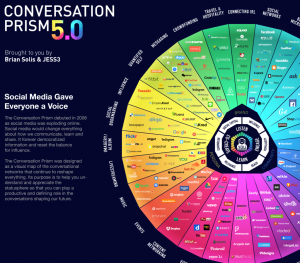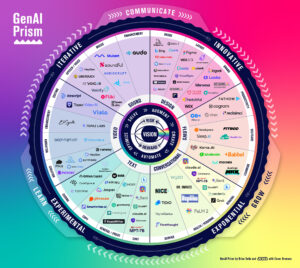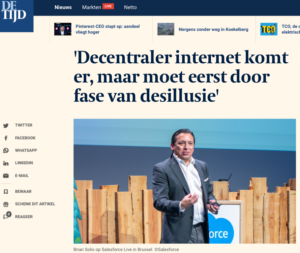
To celebrate the release of Engage!, I was recently asked to share my thoughts on how social media impacts the advertising landscape for the current issue of Winning the Web, a popular magazine related to Web marketing. While the discussion opens with a review of the state and future of online advertising, the discussion also looks at the overall tectonic shift in new media and the profound opportunities that are unfolding.
With Ad:Tech San Francisco on the horizon, the timing couldn’t be better to share the entire interview with you here.
#Engage
Do you feel that there is a place for online advertisers and brands within the social media landscape, or do you think most “just don’t belong” there?
Online advertisers and brands indeed have a role in the social media landscape, it’s just different now. Brands, as well as the online advertisers and marketers that support them, are presented with a new opportunity to make direct connections that still yield traditional results but also set the stage for webwide advocacy and evangelism. To lure attention, the commitment changes from simply paying for visibility and investing in the story, visuals, and also offering a return for engagement, shifting from visibility to presence, which is felt. Essentially, paid media is becoming instrumental in triggering earned media in order to activate visitor experiences and activity.
Do you feel social media is being well-utilized by most companies or corporate entities today?
I believe that in order for companies to realize success in social media, they must become media. Many brands review case studies and plow through customer success stories as a form of inspiration for their experiments and endeavors. We assume, erroneously, that these examples apply to our business and more importantly, we presume that these examples represent success that was predefined and methodically implemented.
This is much more than collecting followers, fans or clickthroughs. It’s now the responsibility of the brand to program meaningful content that creates branded, yet personalized experiences to steer activity, offer guidance, provide resolution, and also spark word of mouth.
Look into your crystal ball – in three years, what do you think social media will mean and/or encompass?
Social Media will essentially become “Media” as we return to the ongoing evolution of new media. Social Media provided everyday users with powerful publishing platforms and the ability to establish influence, introducing production into the consumer consumption equation. It did not, however, change the need to rise above the noise by connecting people and content in order to raise awareness and cause measurable action.
The road to the future begins with understanding that attention is finite and is increasingly thinning, therefore we must connect with individuals where, when, and how their attention is focused. Technology is going to help, but we must help ourselves by introducing relevance, findability, and shareability into the mix. Intelligent filtering will become part of the consumption process, empowering consumers to view the most material information based on their behavior and connections. Priority will focus on aligning, qualifying, and presenting content sourced from the social graph and varying degrees of friends of friends networks.
There have been numerous stories written about companies and brands trying to monetize social media. Do you think these efforts are fruitless or do you feel social media can or should be money-making areas for advertisers?
Social Media is not owned by any one department and as such, the tools and services that populate the new media landscape should be viewed as just that, tools and services. It’s not unlike email for example. Every division affected by outside activity will require an external presence to influence respective activity that positively impacts online societies. As such, monetizing social media becomes an extension of various sales strategies that present those populating a social brand graph (connections forged in social networks related to brands) with offers, specials, rewards, incentives, discounts, etc. Many consumers have shouted in recent surveys that they hope and even expect to receive exclusive opportunities to purchase products or services via social channels such as Twitter and Facebook.
Connect with Brian Solis on Twitter, LinkedIn, Tumblr, Google Buzz, Facebook
—
Please consider reading my brand new book, Engage!
—
Get Putting the Public Back in Public Relations and The Conversation Prism:


—
Image Credit: Shutterstock






I have to respectfully disagree with your first point. Consumers use social media to connect with people. Companies' attempts to engage these forums are doomed to failure because these tools were never designed for the direct engagement you describe. Their attempts actually damage their brand as their messages are viewed as annoying and inauthentic by the majority of users. Instead, new tools need to be developed to facilitate this engagement – ones that were not designed for person-to-person socializing.
Hello…I am not sure if you are speaking about social media use from your perspective or based on existing research. Mostly, the data I've reviewed, and through my own experience, shows the contrary. Social media users (people) are willfully connecting with companies online…and many of them in turn, actively refer brands that do engage to their connections within their social graphs.
I must agree with Brian. People like to connect with companies in social media. In fact, most of them like to join the companies pages and have their logos on their profiles. That´s engaging. It´s the feeling of showing what you like and what your interests are.
Join startups.com for more conversations about social media.
Ignoring whether or not twitter will be adopted across all age ranges in the US, but do you think twitter facilities this type of engagement? There are no rules over person-person, it's not a social network per-se, I don't have friends, it's all about following…
I agree this does happen as you describe. But what doesn't get measured, and therefore doesn't get reported, is the vast number of users that get turned off by brand messages on these networks. More harm than good.
I understand your point, but it doesn't do more harm that good. Of course people are going to get turn off by certain messages, people see over 3,000 ads a day. What companies are trying to do is become more interactive. Having a few brand loyal customers is more important than having a lot of customers who are only going to be one time buyers. Yes the companies can definitely learn from these turned off users, but not measuring this is not going to hurt a company. There has been data showing that fans on pages are more likely to buy products and what not. Good point though.
Lateefivy, I'd like to explore this as it's an extremely valuable point and thinking about this number can help us as marketers understand our role in society…
For the sake of argument, let's say of all marketing today, 1% results in one-time or multiple purchases. The other 99% is wasted, and could turn people off and do more harm than good (that's how I read your suggestion). In fact it's a nuisance (hence ad blockers, dvr ad skipping etc).
Ralph – I'd suggest that with the 99% of people, it does more harm than good – 99x more harm in fact. In your example this is 2,970 ads that I saw but didn't respond to. I suggest this is very harmful. As marketers, we are accepting that sending irrelevant messages to 99%+ of people, interrupting them, providing zero or negative value, infringing on privacy – is all ok.
Even if social media takes this 1% and turns it into 50%, which would be a phenomenal and unheard of 50x increase, you still have 50% investment wasted and you are potentially turning 50% of people off.
The people in the 50% are still suffering with nuisance, and if you used technology to monitor behaviour and mine [ugly word] the social graph, you are potentially even elevating privacy and freedom concerns.
If we don't measure this number, we don't measure the external costs of our business, the cost to people, to society. If we want to help rewrite the rules of advertising and marketing, I suggest this is exactly where we should focus.
Valid points being made here by both Ralph and Gordon . . . but I agree with Gordon a little more. ; )
In society, marketers serve a social good in part by “ringing the cash register” and in part by ethically representing their companies. I think the later is easy to do on Facebook and Twitter, but the former is really difficult. Why? Facebook and Twitter were never designed for marketing. They were designed for meeting people (i.e. dating) and real-time news, respectively. Its mostly by good luck that these tools can be used to represent companies at all, but the ROI on that is tenuous, and the downside effects are significant, as Gordon points out.
In the end, its not an all or nothing thing. Should companies join Twitter and Facebook? Sure, if there goal is merely to “represent” and they accept that they will suffer a certain but unquantifiable amount of brand damage. But if they want to ring the cash register, their efforts are better spent elsewhere.
I don't feel social media is being well-utilized by most companies or corporate entities today. There doesn't seem to be a common “strategy” for businesses to manage their social media. Some rely on internal marketing staff who really aren't sure exactly what to do, or they get someone else to do it, and that person usually doesn't understand the aim of representing the business to engage in social media. This sometimes results in irregular interactions or blatant advertising.
The system will probably iron out over the next few years, but the businesses who do it first and do it right, will be better off.
Here is some data that illustrates my point:
http://www.marketingprofs.com/charts/2010/3547/…
Of particular note:
64% of company decision makers say their companies have not increased revenues or profited from social media, yet 60% of marketing professionals say lead generation is their primary reason for using social media.
We're still early in the adoption, but one thing is plain as day to me. The current social media tools are the wrong ones if your goals are revenue and profitability. They weren't designed for that.
Interesting discussion. I believe the reason companies fail when using social media is because they saw it primarily as another tool to help generate revenue. Any company that starts at this premise in regards to social media will always fail. Social media is a communications tool that is meant to help connect people and yes, brands too.
When a brand uses social media correctly, consumers connect to it, which often results in long-term gains for the company. Think about it in your own life. Each time you have a positive interaction with someone representing a company, your opinion of the company rises. You think, gee, they listened to me and seemed to really respect what I have to say. With each positive engagement, the chances of you interacting with that company again (i.e. becoming a loyal customer) increases. As the company builds its relationship and trust with you, it will also begin to increase its bottom line primarily because we, as humans, are more apt to buy something from a friend than a stranger.
We’re living in an interesting and exciting time. Consumers are exerting their power and marketing is changing to meet consumers’ demands. As such, I’d argue that companies really need to focus on developing solid relationships with customers than primarily on revenue. When they put the relationship first, they'll do whatever it takes to strengthen that relationship. And the stronger the relationship they have with their customers the more likely it will translate into revenue.
I saw the chart Lateefivy posted. I noticed that there was no information as to what time frame the study captured. From the way it was presented, it seemed like it was a short time frame, maybe a year or two. If that's the case, then I'm not surprised the companies didn't make money using social media. I'd argue social media isn't meant to be a tool to quickly garner cash. Now if you extend the time frame, I'm willing to bet that the results would be different. That's because trying to create a relationship using social media is no different from trying to develop a relationship through other means. Relationships aren't born over night.
I will also agree with Brian with companies using social media to connect to their consumers. People like to be part of something–especially big names like Coke, Starbucks…They'd want to be a part of that even if it's just FB. (Yes, they'd love to be friends with Coke). If they have the newest gadget, and they love it, they will flaunt it on FB or twitter. They see a new movie they like…they will be a fan or the movie. They will tweet about it or say something on FB.
Are these companies fully utilizing the using of social media? Probably not. And it's not measurable either. The trick to social media is to get these people to promote your product for you. These people give free reviews, reactions of your product to other people–sort of enticing them to buy the product they so raved about. Example, Twitter user#1 sees Clash of Titans. He tweets about it in a positive light. Friends of Twitter user #1 would go see it on his recommendation. If they like it, the movie would get more tweets. And advertisers didn't have to do anything about it.
There are other ways they use social media. Other examples I've seen where companies use social media is for events. If they have events, they offer discounts and give out codes in twitter, etc. Another example I remember for Starbucks, you can give out virtual Starbucks in FB. Isn't it smart these people making consumers promote their products? Hey, even my own friends sell stuff online.
So, no, I don't think it's doom to failure nor it does any harm to companies as Lateefivy pointed out. As long as it's not spammy and they are usually not. As long as they present it brilliantly, people will buy it. Is it applicable to all? Probably not. Today, social media is not just for personal networking.
PS… Here are more strategies and ways to market in social media http://sn.im/vlo1n
It is no surprise that the use of social media by marketers and advertisers does not translate into profits as some people (@ Lateefivy, et al) have commented here.
Social media is really a public relations tool. It is about building relationships, engaging with your publics and showing that you listen. It is about listening, engaging and responding. Not about selling and making profits.
I totally agree with Toivo Mvula. It is all about building the business relationships which, of course is going to lead the business to grow and increase the sales volume.
Besides, social media has a lot of influence on the branding process; http://startups.com/questions/14407/social-medi…
“Social Media is not owned by any one department and as such, the tools and services that populate the new media landscape should be viewed as just that, tools and services”
As it is mentioned by the author, social media is a tool and it should be used for the advantage of businesses.